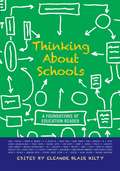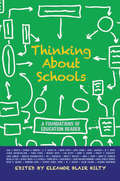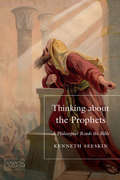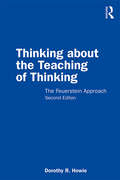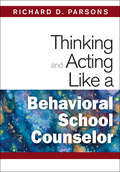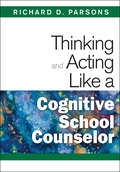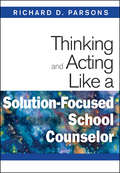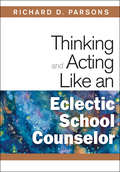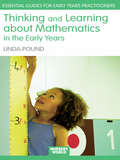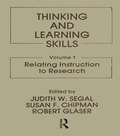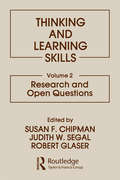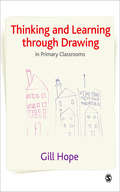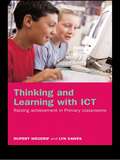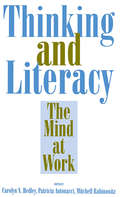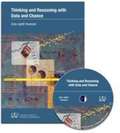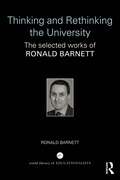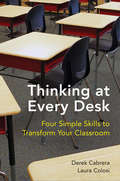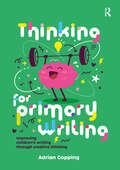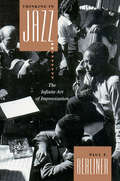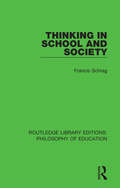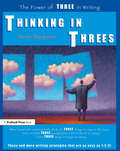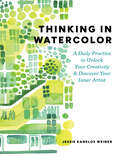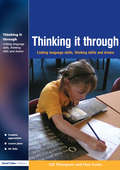- Table View
- List View
Thinking about Schools
by Eleanor Blair HiltyDesigned specifically for students with little or no education background, Thinking About Schools is an essential collection of classic and contemporary readings that provides a complete, balanced overview of educational foundations. Anchored in classic scholarship from the 1960s to today, this book also incorporates a number of thought-provoking popular essays that will engage students and encourage critical thinking about vital issues concerning the purpose of education, curriculum content, the roles and responsibilities of students and teachers, and new directions for education in the twenty-first century. In addition to selecting each reading for its impact and accessibility, editor Eleanor Blair Hilty further promotes student comprehension by including introductions, discussion questions, guides to further reading, and related resources for each of the five parts.
Thinking about Schools
by Eleanor Blair HiltyDesigned specifically for students with little or no education background, Thinking About Schools is an essential collection of classic and contemporary readings that provides a complete, balanced overview of educational foundations. Anchored in classic scholarship from the 1960s to today, this book also incorporates a number of thought-provoking popular essays that will engage students and encourage critical thinking about vital issues concerning the purpose of education, curriculum content, the roles and responsibilities of students and teachers, and new directions for education in the twenty-first century. In addition to selecting each reading for its impact and accessibility, editor Eleanor Blair Hilty further promotes student comprehension by including introductions, discussion questions, guides to further reading, and related resources for each of the five parts.
Thinking about Schools: A Foundations of Education Reader
by Eleanor Blair HiltyDesigned specifically for students with little or no education background, Thinking About Schools is an essential collection of classic and contemporary readings that provides a complete, balanced overview of educational foundations. Anchored in classic scholarship from the 1960s to today, this book also incorporates a number of thought-provoking popular essays that will engage students and encourage critical thinking about vital issues concerning the purpose of education, curriculum content, the roles and responsibilities of students and teachers, and new directions for education in the twenty-first century. In addition to selecting each reading for its impact and accessibility, editor Eleanor Blair Hilty further promotes student comprehension by including introductions, discussion questions, guides to further reading, and related resources for each of the five parts.
Thinking about the Prophets: A Philosopher Reads the Bible (JPS Essential Judaism)
by Kenneth SeeskinRethinking the great literary prophets whose ministry ran from the eighth to the sixth centuries BCE—Amos, Hosea, First Isaiah, Jeremiah, Ezekiel, Second Isaiah, and Job—Thinking about the Prophets examines their often-shocking teachings in light of their times, their influence on later Western and Jewish thinkers, and their enduring lessons for all of us. As a noted scholar of Jewish philosophy, Kenneth Seeskin teases out philosophical, ethical, and theological questions in the writings, such as the nature of moral reasoning, the divine persona, divine providence, the suffering of the innocent, the power of repentance, and what it means to believe in a monotheistic conception of God. Seeskin demonstrates that great ideas are not limited by time or place, but rather once put forth, take on a life of their own. Thus he interweaves the medieval and modern philosophers Maimonides, Kant, Cohen, Buber, Levinas, Heschel, and Soloveitchik, all of whom read the prophets and had important things to say as a result. We come to see the prophets perhaps in equal measure as divinely authorized whistle-blowers and profound thinkers of the human condition. Readers of all levels will find this volume an accessible and provoking introduction to the enduring significance of biblical prophecy.
Thinking about the Teaching of Thinking: The Feuerstein Approach
by Dorothy R. HowieThinking about the Teaching of Thinking provides an accessible and comprehensive introduction to Feuerstein’s theory of Mediated Learning Experience and its related tools and programmes. It details up-to-date international and New Zealand research on the Feuerstein approach which reflects the current issues in the teaching of thinking. The book begins by defining what is meant by the teaching of thinking and provides an easy to understand explanation of the Feuerstein method and its value for children with learning challenges. It champions a ‘whole school’ approach to the teaching of thinking and details the practical tools and programmes developed by Feuerstein – such as Instrumental Enrichment and the Learning Propensity Assessment Device – to aid in its implementation. It also recognises the key importance of cultural factors in the teaching of thinking, bringing together the author’s considerable research experience using the Feuerstein method in the multicultural New Zealand context with her extensive knowledge of international Feuerstein research. This book provides a user-friendly and unique coverage of the Feuerstein method for researchers and postgraduate students researching and working in educational psychology. It will also be of great value for teachers and parents looking to understand and decide on implementation of the Feuerstein approach in their schools.
Thinking and Acting Like a Behavioral School Counselor
by Dr Richard D. ParsonsEmphasizing skill development through practice and feedback, this concise book offers new and experienced counselors a reflective practitioner model and introduces the fundamentals of behavioral analysis.
Thinking and Acting Like a Cognitive School Counselor
by Richard D. ParsonsThis concise guide provides a reflective process for effective school counseling, the fundamentals of cognitive counseling, effective intervention strategies, in-depth case studies, and guided practice exercises.
Thinking and Acting Like a Solution-Focused School Counselor
by Richard D. Parsons"This should be a required text for a school counseling degree."—Jill R. Boyd, Counselor and Olweus Bullying Prevention TrainerJohn Bullen Middle School, Kenosha, WI"The author knows solution-focused counseling inside and out. He describes in excellent detail how to use this technique with multiple problems and multiple ages. The examples are spot on."—Cynthia Knowles, Prevention SpecialistLivonia Central School District, NYLearn how to emphasize students′ strengths to help them resolve problems!This book helps new and experienced school counselors engage with students using a solution-focused approach that stresses cooperation and highlights positive attributes to facilitate goal achievement. Thinking and Acting Like a Solution-Focused School Counselor provides the background and expertise needed to establish collaborative student relationships, identify student skills and abilities, and reframe problems into attainable goals. Emphasizing practice and feedback, the author includes actual session transcripts to help new and less-experienced counselors apply concepts directly to their own practice. Benefits of this book include: A reflective, meaning-making model as a basis for effective school counselingAn introduction to the fundamental principles of solution-focused counselingClinical illustrations of solution identification and implementation strategies In-depth case studies and guided practice exercisesLike the companion books on behavioral, cognitive, and eclectic school counseling, this concise guide offers the knowledge and skills necessary to help troubled students in need of encouragement and hope.
Thinking and Acting Like an Eclectic School Counselor
by Richard D. ParsonsEmphasizing a reflective practice, this book presents an eclectic model for evaluating student information and selecting the most effective interventions from a variety of therapeutic approaches.
Thinking and Deciding
by Jonathan BaronBeginning with its first edition and through subsequent editions, Thinking and Deciding has established itself as the required text and important reference work for students and scholars of human cognition and rationality. In this, the fourth edition, Jonathan Baron retains the comprehensive attention to the key questions addressed in the previous editions - How should we think? What, if anything, keeps us from thinking that way? How can we improve our thinking and decision making? - and his expanded treatment of topics such as risk, utilitarianism, Baye's theorem, and moral thinking. With the student in mind, the fourth edition emphasises the development of an understanding of the fundamental concepts in judgement and decision making. This book is essential reading for students and scholars in judgement and decision making and related fields, including psychology, economics, law, medicine, and business.
Thinking and Learning About Mathematics in the Early Years (Essential Guides for Early Years Practitioners)
by Linda PoundHow can early years practitioners help young children to become not only numerate but aspiring mathematicians who love numbers, shapes and mathematical comparisons? The introduction of the Foundation Stage has led to practitioners seeking ways to teach maths which are more in line with the creative and playful ways young children learn other subjects. Linda Pound draws on current thinking about children's mathematical development to show how you can encourage and enhance the numeracy skills of any child in the early years by linking maths to every-day life situations and making it a playful and enjoyable cross-curricular activity. This highly practical and engaging text includes chapters on: why maths is often seen as 'hard' and what practitioners can do to help young children be more successful exploring shapes, space, measures and patterns how to make maths more fun and playful, using games, humour, stories and rhymes using music and dance to enhance mathematical understanding encouraging children to see the connection between maths and everyday experiences through, for example sorting, matching and guessing creating an environment for mathematical development, indoors and out Concluding with a chapter on how practitioners and parents can become more confident in their use of maths, this user-friendly text, packed full of ideas, is essential reading for practitioners in any early years setting. Students on Early Education courses will also find much here to inspire them.
Thinking and Learning Skills: Volume 1: Relating Instruction To Research (Psychology of Education and Instruction Series)
by Judith W. Segal, Susan F. Chipman and Robert GlaserFirst Published in 1985. Routledge is an imprint of Taylor & Francis, an informa company.
Thinking and Learning Skills: Volume 2: Research and Open Questions (Psychology of Education and Instruction Series)
by Susan F. Chipman and Judith W. Segal and Robert Glaser"First Published in 1985, Routledge is an imprint of Taylor & Francis, an informa company."
Thinking and Learning Through Drawing: In Primary Classrooms
by Mrs Gill Hope'The text is clear and accessible and gives a fascinating overview of how drawing can help children to learn and understand the thinking of others...It is highly recommended for all students and practitioners interested in understanding more about how children express their ideas and theories about the world' - Early Years Update 'This book is an invaluable resource for anyone who recognises the potential of 'drawing' as an essential element for developing thinking and learning in the Primary Classroom...and a 'must read' for those who are sceptical!....This is a fascinating read that invokes a variety of feelings including a sense of wonder and curiosity about the many facets of drawing, which leaves you with a thirst to try out more and explore ways of releasing the untapped potential of 'drawing' in your own classroom' - thinkingclassroom.co.uk Children use drawing as a means through which they create, develop, communicate and record their thoughts and ideas. Whether it's to play, or to express feelings and meaning, drawing enables them to learn about the world, explore their imaginations, and to invent and present new ideas. With an extensive background in teaching and researching children's uses of drawing, Gill Hope describes the ways in which multiple forms of drawing are used by Primary school children. She explains why it should be actively promoted as a means of supporting thinking and learning across a wide range of subject areas, and provides practical support for teachers. Demonstrating the importance of drawing, and combining a thematic approach with practical guidance, this informative and enjoyable book: - widens teachers' understanding of the multiple uses of drawing; - shows how children can be guided to use it to support thinking and learning; - explores the range of applications in which drawing can be used across all areas of the curriculum; - looks to the future and at the ever increasing importance of graphic literacy. Providing a fresh insight into the uses of drawing as a powerful tool which supports children's thinking and learning, this book will be of interest to everyone involved in the development of children's capabilities, including teachers, student teachers and teaching assistants.
Thinking and Learning with ICT: Raising Achievement in Primary Classrooms
by Lyn Dawes Rupert WegerifPrimary teachers need to incorporate the use of computers in their daily lesson plans, but how can this be done most effectively to promote learning skills in the classroom? In this fascinating book, Lyn Dawes and Rupert Wegerif outline a strategy for enhancing the effectiveness of computers for teaching and learning with an emphasis on: * raising pupil achievement in the core subject areas* developing collaborative learning in small groups* using group discussions as a way of improving general communication, as well as thinking and reasoning skills. The approach is to use computers as a support for collaborative learning in small groups and this book presents ways to prepare pupils for talking, learning and thinking together around computers. Excerpts from pupils' discussions illustrate the main issues and guidance on lesson planning and developing and choosing appropriate software is also provided. Thinking and Learning with ICT will be a valuable resource for primary teachers and student teachers.
Thinking and Literacy: The Mind at Work
by N. Hedley Carolyn Antonacci Patricia Rabinowitz MitchellThis volume explores higher level, critical, and creative thinking, as well as reflective decision making and problem solving -- what teachers should emphasize when teaching literacy across the curriculum. Focusing on how to encourage learners to become independent thinking, learning, and communicating participants in home, school, and community environments, this book is concerned with integrated learning in a curriculum of inclusion. It emphasizes how to provide a curriculum for students where they are socially interactive, personally reflective, and academically informed. Contributors are authorities on such topics as cognition and learning, classroom climates, knowledge bases of the curriculum, the use of technology, strategic reading and learning, imagery and analogy as a source of creative thinking, the nature of motivation, the affective domain in learning, cognitive apprenticeships, conceptual development across the disciplines, thinking through the use of literature, the impact of the media on thinking, the nature of the new classroom, developing the ability to read words, the bilingual, multicultural learner, crosscultural literacy, and reaching the special learner. The applications of higher level thought to classroom contexts and materials are provided, so that experienced teacher educators, and psychologists are able to implement some of the abstractions that are frequently dealt with in texts on cognition. Theoretical constructs are grounded in educational experience, giving the volume a practical dimension. Finally, appropriate concerns regarding the new media, hypertext, bilingualism, and multiculturalism as they reflect variation in cognitive experience within the contexts of learning are presented.
Thinking and Reasoning with Data and Chance Sixty-eighth Yearbook
by Portia C. Elliott Gail F. BurrillThe 2006 NCTM Sixty-eighth Yearbook focuses on students' and teachers' learning in statistics centered on a set of activities. Topics include the relation between mathematics and statistics, the development and enrichment of mathematical concepts through the use of statistics, and a discussion of the research related to teaching and learning statistics. The yearbook articles cover a variety of broad areas, including sections on Learning about Data and Chance, Reasoning with Data and Chance, and Reflecting on Issues Related to Data and Chance. Articles focus on such topics as examining children's beliefs about what is fair and using simulation techniques in the classroom. NCTM yearbooks focus concerted attention on timely issues by viewing them in depth, from multiple perspectives, through interdisciplinary lenses, and across different grade bands. The year 2006 marks the sixty-eighth yearbook in the NCTM yearbook series.
Thinking and Rethinking the University: The selected works of Ronald Barnett
by Ronald BarnettIn the World Library of Educationalists series, international scholars compile career-long selections of what they judge to be among their finest pieces so the world has access to them in a single manageable volume. Readers are able to follow the themes and strands and see how their work contributes to the development of the field. Over more than three decades, Professor Ronald Barnett has acquired a distinctive position as a leading philosopher of the university and higher education, and this volume brings together 15 of his key writings, particularly papers from leading journals. This volume also includes, as his introductory chapter, an intellectual autobiography, in which Professor Barnett recounts the history of his scholarship and writing, traces its development across five stages, and identifies the themes and sources of inspiration that lie within his corpus of work. Ronald Barnett has described his corpus of work as a social philosophy of the university that is at once conceptual, critical, practical and imaginative. His concepts of criticality, critical interdisciplinarity, supercomplexity and the ecological university have been taken up in the literature across the world. Through telling examples, and with an incisive clarity of writing, Ronald Barnett’s scholarship has helped to illuminate in fresh ways and reorient practices in the university and in higher education. The chapters in this volume reveal all of these qualities so making this volume a compelling overview of a passionate and yet constructive critic of the university.
Thinking at Every Desk: Four Simple Skills to Transform Your Classroom
by Laura Colosi Derek CabreraCutting-edge skills for twenty-first-century learners and educators. Designed to transform teaching practice, this book provides the tools to understand thinking patterns and how learning actually happens. It empowers teachers to structure learning in the most meaningful way, helping students explore new paths to knowledge.
Thinking for Primary Writing: Improving Children’s Writing Through Creative Thinking
by Adrian CoppingDrawing on the author's personal experience, this book provides a deeper understanding of how children experience the writing process in primary school. The framework termed 'think for writing' demonstrates that training children in creative writing and providing creative thinking opportunities can develop their writing and improve their confidence in writing.Aimed at all teachers and trainees, it examines each element of the framework: the thinking environment, task design, training creative thinking, the building blocks of the writing process, and developing children's creative self-efficacy. This range of ideas and approaches across all elements of the writing process that teachers can adapt, adopt and apply to their own practice. This book also demonstrates that a lot of the key work in developing writing is done in between the building blocks of the writing process. This work in the gaps includes process feedback and feedback on the application of ideas.Ultimately, this book provides a resource for teachers to develop their writing pedagogy and children's outcomes whilst meeting National curriculum for England and Wales requirements and demands of standardised testing. Teachers can feel a lot more assured when designing units of work in primary English with this helpful framework, that provides them with this knowledge and details on how to apply it.
Thinking in Jazz: The Infinite Art of Improvisation
by Paul F. BerlinerThinking in Jazz reveals as never before how musicians, both individually and collectively, learn to improvise. Chronicling leading musicians from their first encounters with jazz to the development of a unique improvisatory voice, Paul Berliner documents the lifetime of preparation that lies behind the skilled improviser's every idea.
Thinking in School and Society (Routledge Library Editions: Philosophy of Education #16)
by Francis SchragIn this book, first published in 1988, the author integrates relevant ideas from philosophy, psychology, sociology, economics and political science to provide a comprehensive analysis of the problem of education for thinking. Professor Schrag takes account of the classroom as well as the larger society, and includes practical recommendations for creating new settings designed to enhance students’ thoughtfulness.
Thinking in Threes: The Power of Three in Writing
by Brian BackmanThis practical resource helps students see the importance of “the rules of three” in writing successful essays. The student-friendly activities in this book give students essay-writing strategies organized in easy-to-remember groups of three. The book includes many activities and games that help point out the importance of the number three in our language.With Thinking in Threes, powerful writing strategies are as easy as 1-2-3! Some of the rules of three explained in this book include:three steps for brainstorming,three “Ps” of a thesis statement,three parts of an essay,three paragraphs in the body of an essay,three ways to connect paragraphs and sentences,three types of evidence to support topic sentences,three qualities of a good example,three things to include in a quotation,three ways to hook the reader in an introduction,three ways to write fluent sentences,three ways to write successful conclusions, andthree phrases for completing a timed writing assignment.The goal of Thinking in Threes is to empower students to write great essays in your classroom!Grade 5-Adult
Thinking in Watercolor: A Daily Practice to Unlock Your Creativity & Discover Your Inner Artist
by Jessie Kanelos WeinerA 30-day masterclass in the art of using watercolor to tell your own stories. Unlike most watercolor instruction books based on rote copying of classic watercolor subjects, Thinking in Watercolor encourages readers to use art as a means of self-expression. Author and in-demand illustrator Jessie Kanelos Weiner encourages readers through foundational watercolor techniques and shows how to adapt them to share their personal experiences over the course of several days. On Day 10 they&’ll illustrate a family recipe; on Day 14 they&’ll go on a scavenger hunt through a local museum—and so forth. As both a commercial illustrator and professional art instructor, Jessie is uniquely poised to offer readers insider tips and clever visualizations of the creative process—and she brings each lesson to life with her vivid illustrations and stories from her life as an ex-pat in Paris. It all adds up to a volume that&’s at once inspiring, charming, and informative—the perfect gift for anyone looking to begin or reignite a personal art practice.
Thinking it Through: Developing Thinking and Language Skills Through Drama Activities
by Gill Thompson Huw EvansTeaching should be exciting and creative but an overcrowded curriculum can make this hard for teachers to achieve. Help is at hand with these literacy and numeracy lesson plans that also cover language development, thinking skills, and drama. Thinking it Through allows teachers to customize lesson plans to meet their own needs using the book's accompanying CD as well as assess pupils language abilty with handy photocopiable assessment worksheets. The book will help each child reach their full potential regardless of ability using ideas for differentiation and extension and structure lessons according to national curriculum objectives.
